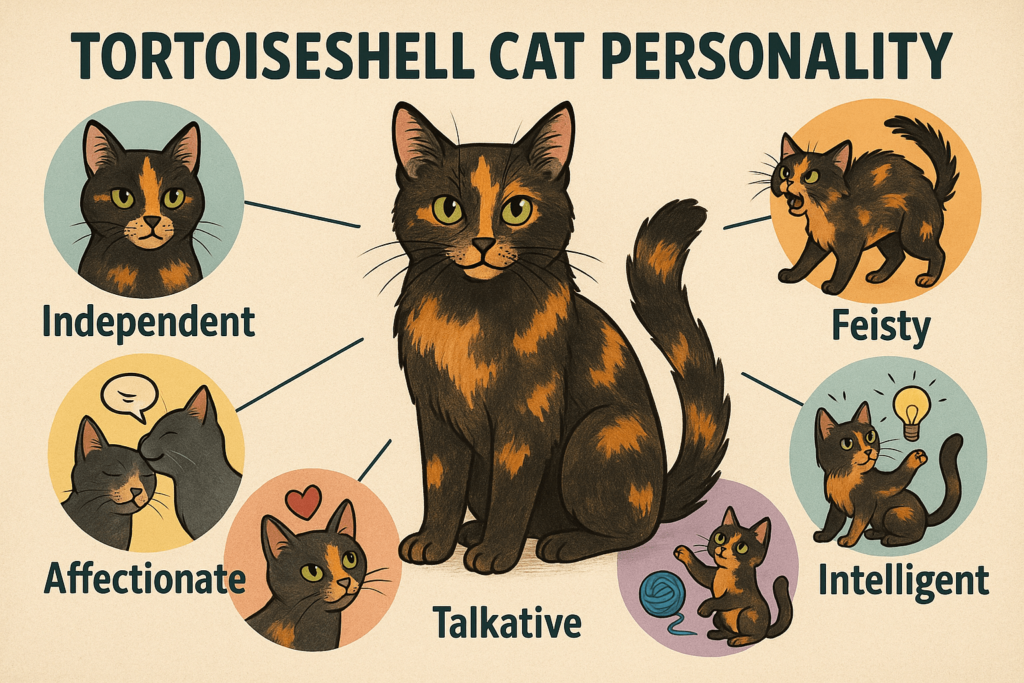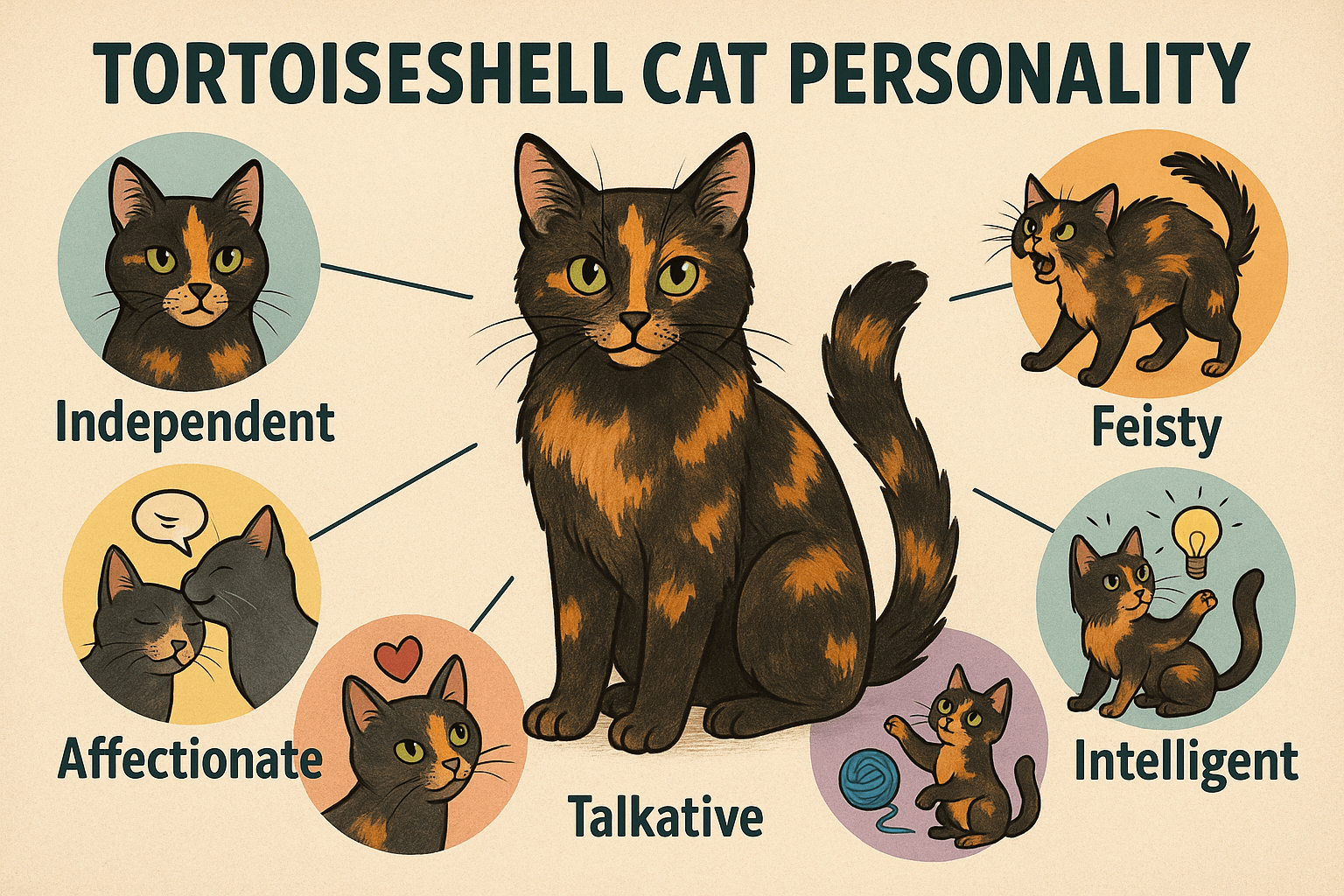Tortoiseshell Cat Personality: What Makes Them So Unique?
Tortoiseshell cats, affectionately known as “torties,” are famous for their striking coat patterns and vibrant personalities. These feline beauties are not a specific breed but rather a unique coloration caused by a mix of black and orange (or their diluted variants like gray and cream). Beyond their stunning appearance, tortoiseshell cats are often celebrated for their bold and spirited nature. Many cat lovers believe that torties possess a special charm and energy that sets them apart from other cats. But what exactly defines the tortoiseshell cat personality? In this blog post, we’ll explore the traits, quirks, and fascinating characteristics that make torties so beloved by their owners.
Key Traits of Tortoiseshell Cats
The tortoiseshell cat personality is as colorful and dynamic as their coat. While every cat is an individual, torties are often described as having a distinct set of traits that make them stand out. Here’s what many owners notice about their tortie companions:
Feisty and Independent:
Torties are known for their strong-willed nature. They often prefer to do things on their own terms, making them fiercely independent pets.Playful and Energetic:
These cats love to play and explore their surroundings. Their playful antics can bring endless entertainment to any household.Affectionate but Selective:
While torties can be loving and cuddly, they tend to form deep bonds with one or two people in the family, showing loyalty and devotion.Talkative and Opinionated:
Torties aren’t afraid to voice their opinions. They may “talk” frequently, letting you know when they’re happy, hungry, or simply want attention.Moody but Endearing:
Some torties have a reputation for being a bit moody, earning them the nickname “tortitude.” However, their mood swings only add to their charm.
These traits combine to create a personality that’s equal parts fiery and lovable, making tortoiseshell cats unforgettable companions.

Why Are Tortoiseshell Cats So Special?
Tortoiseshell cats are often considered magical or mystical due to their rarity and unique qualities. Here are some reasons why these cats hold a special place in the hearts of feline enthusiasts.
Rare Genetic Makeup:
The tortoiseshell pattern is caused by a genetic phenomenon involving two X chromosomes, which makes male torties incredibly rare.Symbol of Good Luck:
In many cultures, tortoiseshell cats are seen as symbols of good fortune and prosperity, adding to their allure.Distinct Coat Patterns:
No two tortoiseshell cats have identical markings, making each one truly one-of-a-kind.Strong Bonds with Owners:
Despite their independence, torties often form deep emotional connections with their human companions, creating lifelong friendships.Personality Legends:
Stories abound about torties displaying extraordinary intelligence, loyalty, and even a touch of mischief, further fueling their mystique.
The combination of their rarity, beauty, and captivating personalities makes tortoiseshell cats truly special.
Check this guide 👉Tortoiseshell Tuxedo Cat: Best 7 Expert Tips!
Check this guide 👉The Enchanting Lilac Tortoiseshell Cat: Best 7 Expert Tips!
Check this guide 👉Unique Names for Your Tortoiseshell Cat: Best 7 Tips!
Tortoiseshell Cat Personality Traits | How to Care for Your Tortie |
|---|---|
Feisty and independent | Provide plenty of mental stimulation |
Playful and energetic | Offer interactive toys and activities |
Affectionate but selective | Spend quality time bonding |
Talkative and opinionated | Listen and respond to their needs |
Moody but endearing | Be patient during mood swings |
Understanding the Myth of “Tortitude”
The term “tortitude” has become synonymous with the bold and sometimes unpredictable behavior of tortoiseshell cats. While not all torties exhibit this trait, it’s worth exploring what “tortitude” really means.
What Is Tortitude?
Tortitude refers to the feisty, sassy, and occasionally stubborn behavior that some tortoiseshell cats display. It’s a playful way to describe their fiery spirit.Confidence and Assertiveness:
Torties often act with confidence, asserting themselves in situations where other cats might be more reserved.Demanding Attention:
If a tortie wants something—whether it’s food, affection, or play—they won’t hesitate to demand it loudly and persistently.Mood Swings:
Owners may notice sudden shifts in their tortie’s mood, from sweet and loving to aloof or irritable, though these changes are usually short-lived.Loyalty with a Twist:
Despite their occasional sassiness, torties are deeply loyal and form strong attachments to their favorite humans.
Understanding tortitude helps owners appreciate the unique balance of independence and affection that torties bring into their lives.
Tips for Living Happily with a Tortoiseshell Cat
Living with a tortoiseshell cat can be incredibly rewarding if you know how to cater to their personality. Here are some tips to ensure a harmonious relationship with your tortie.
Respect Their Independence:
Allow your tortie space to explore and make decisions on their own terms. Avoid forcing interactions when they’re not in the mood.Provide Mental Stimulation:
Keep your tortie entertained with puzzle toys, climbing structures, and interactive games to channel their energy productively.Set Clear Boundaries:
Establish consistent rules and routines to help manage their assertive behavior and prevent unwanted habits.Reward Good Behavior:
Use treats, praise, and affection to reinforce positive actions and strengthen your bond with your tortie.Be Patient During Mood Swings:
Understand that mood changes are part of their charm. Approach them calmly and give them time to settle down.
By embracing their quirks and providing proper care, you can enjoy a fulfilling relationship with your tortoiseshell companion.
How to Prepare Your Home for a Tortoiseshell Cat
Bringing a tortoiseshell cat into your home requires some preparation to ensure they feel safe and stimulated. These steps will help you create a welcoming environment for your new companion.
Create Vertical Spaces:
Install shelves, cat trees, or perches to satisfy their love for climbing and observing their surroundings.Offer Hiding Spots:
Provide cozy hiding places like enclosed beds or boxes where your tortie can retreat when feeling overwhelmed.Stock Up on Toys:
Choose a variety of toys, including wand teasers and puzzle feeders, to keep their active minds engaged.Use Scratching Posts:
Place scratching posts around the house to protect furniture and allow your tortie to maintain healthy claws.Introduce Gradually:
If you have other pets, introduce your tortie slowly to reduce stress and foster positive relationships.
Preparing your home thoughtfully ensures a smooth transition for your tortoiseshell cat.
Fun Facts About Tortoiseshell Cats
Tortoiseshell cats are full of surprises! Here are some fun facts that highlight just how amazing these felines are.
They’re Almost Always Female:
Due to genetics, about 99.9% of tortoiseshell cats are female, making males incredibly rare.Their Coats Are Unique:
Like fingerprints, no two tortoiseshell cats share the exact same pattern.Cultural Significance:
In Japan, tortoiseshell cats are believed to bring financial luck and ward off evil spirits.They’ve Inspired Art and Literature:
Torties have appeared in countless works of art, folklore, and literature as symbols of mystery and elegance.Tortitude Is Real—but Manageable:
While their fiery personality is legendary, patience and understanding go a long way in managing their spirited nature.
These fun facts showcase why tortoiseshell cats continue to captivate hearts worldwide.
Signs Your Tortoiseshell Cat Trusts You
Building trust with a tortoiseshell cat takes time, but there are clear signs that indicate they’ve formed a strong bond with you. Look for these behaviors to gauge their level of trust.
Purring Around You:
A tortie who purrs while near you is showing contentment and affection.Kneading on Your Lap:
This behavior mimics kittenhood and signifies comfort and trust.Sleeping Near You:
If your tortie chooses to nap close to you, it’s a sign of deep attachment.Exposing Their Belly:
Rolling onto their back and showing their vulnerable belly is a gesture of trust.Following You Around:
A tortie who trails after you is demonstrating loyalty and a desire to be near you.
Recognizing these signs helps you understand the depth of your connection with your tortoiseshell cat.
Frequently Asked Questions About Tortoiseshell Cats
Are tortoiseshell cats a specific breed?
No, tortoiseshell refers to a coat pattern rather than a breed. Torties can appear in many different breeds.
Why are male tortoiseshell cats so rare?
Male torties are extremely uncommon because the tortoiseshell pattern requires two X chromosomes, which males typically lack.
Do tortoiseshell cats have health issues?
Generally, torties are healthy cats. However, male torties may have genetic conditions like Klinefelter syndrome, which can cause health concerns.
Are tortoiseshell cats more aggressive?
While some torties are feisty, aggression varies by individual. Proper socialization and care can help manage any challenging behaviors.
How can I bond with my tortoiseshell cat?
Spend quality time playing, grooming, and engaging with your tortie. Respect their preferences and let them come to you when they’re ready.
Embracing the Magic of Tortoiseshell Cats
Tortoiseshell cats are truly one of a kind, blending striking beauty with unforgettable personalities. Whether it’s their playful antics, fierce independence, or moments of tender affection, torties bring joy and excitement to any home. By understanding their unique traits and catering to their needs, you can build a lasting bond with your tortoiseshell companion. While they may have a reputation for “tortitude,” their quirks only add to their charm. If you’re lucky enough to share your life with a tortie, cherish every moment—they’re sure to leave pawprints on your heart forever.
Dog Tapeworm Life Cycle: Best 7 Expert Tips! – Learn how tapeworms infect dogs, spot symptoms, and break the cycle with expert prevention strategies.
Anxious Cat Body Language: Best 7 Expert Tips! – Learn to spot signs of stress, understand triggers, and help your cat feel safe and relaxed.
Anxious Dog Body Language: Best 7 Expert Tips! – Learn to spot signs of anxiety, respond effectively, and help your dog feel safe and secure.
Is Breeding Dogs Bad? Best 7 Expert Tips! – Explore the ethics, benefits, and risks of dog breeding to make informed decisions for a better future.





